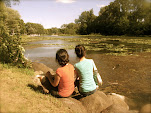When I first met Judith Farquhar in her office in the deep winter of 2006, my heart beated quickly and I lingered outside the Anthropology building in U of C and my body trembled. I, the ignorant inquirer of my unknown future, would meet the famous scholar whose recent work
Appetite: Food and Sex in Postsocialist China seemed both intriguing and elusive to me. Our meeting that day turned out to be brief and unsuccessful, with me asking stupid questions and her caught in a bad cold, our conversation interrupted by my silence and her coughs. When I left her office in dismay, I only remembered one message: "haven't read any Foucault? Read some Foucault."
With this prescription in mind, I felt greatly frustrated by Paul Rabinow's
The Foucault Reader and Byron Goods'
book. It's just too difficult for me to make sense of. I largely gave up applying to anthropology programs because of my initial frustration on Foucault..
That's why I felt especially relieved when I finished reading my first Foucault book,
The Birth of the Clinic, from back to back. Now I can see why this man was so influential and why Judith asked me that question while deeply troubled by her running nose. His prose was so difficult yet so fascinating. The word 'gaze' that he used so often in this book is the best description of what I felt: Foucault's own gaze into the obscure past of modern medicine, the illuminating, penetrating, and unforgiving gaze. Precise, painful, yet so beautiful. There's indeed something special about this man.
Skipping a lot of detailed narratives, I tried to grasp his main arguments. First, I found his theory of three layers of spatialization in medicine quite useful: 1) the 2-dimensional spatialization of diseases in the intellectual landscape of nosology and categories; 2) the 3-dimensional localization of diseases in the actual human body; 3) the social spacialization of healing institutions and associated infrastructures. I found most history of medicine monographs can be characterized accordingly. While Professor Kuriyama's work mainly discussing the conjunction of the first and the second layer, Charles E. Rosenberg's work basically concerned the third. So where am I? It's an important question to ponder from now on.
Second, I could see Foucault's effort to locate the "mutating" moment of medicine to the late-18th century France, and the particular connection with the Enlightenment and the French Revolution during that time. I was surprised to learn that universities were shut down at that time, and it provided an unprecedented chance for physicians to abolish established Galenic systems and experiment under a new light. I cannot list all details here, but it intrigued me to probe into the social history of French Revolution and the rejection of a consistent, homogenous "western" system of medicine as oppose to a similarly consistent "Eastern" one.
Thirdly, his discussion of the problem of medical professionalization, the dilemma between the necessity to create a privileged group with esoteric knowledge and the Revolution's claim to abolish all other guilds and old institutions. He termed it "the dictatorship of genius" and "the sovereign liberty of truth." Although he did not develop it further here, it is basically the source of the so-called "bio-power" in his other works.
I would finish for now by a quote reflecting the new light assumed by death, according to Foucault: "The living night is dissipated in the brightness of death." What doctors cannot know from a living patient could suddenly be revealed by dissecting his body after death. Death is no longer the ending point of all lives and diseases, but a point of departure in which new lights on life and disease could be harvested. I know I'll return to this book sooner or later, and hopefully, Foucault will not seem so overwhelming to me by then.
Labels: History_Sci and Med, Social Science_Misc


